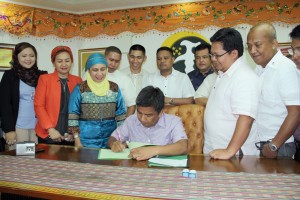ARMM goes ahead, passes own RH law

THE AUTONOMOUS Region in Muslim Mindanao OIC-Gov. Mujiv Hataman signs the reproductive health bill in Cotabato City with assembly representatives and ARMM cabinet secretaries present. PHOTO COURTESY OF ARMM
DAVAO CITY—Without too much ado, and way ahead of the Philippine Congress which is still locked up in a long-drawn debate, the Autonomous Region in Muslim Mindanao (ARMM) approved its version of reproductive health (RH) care for its citizens on Monday.
Known as the Reproductive Health Care Act of 2012 for the ARMM, Muslim Mindanao Autonomy Act No. 2921 seeks to protect the rights and welfare of women and children, by not only requiring the autonomous government to carry out programs on family planning and ensure that information about these programs are available to the poor, but also by providing funds to carry out these programs.
ARMM Gov. Mujiv Hataman on Monday signed the new law, which was passed by the ARMM regional legislative assembly on Dec. 13.
The ARMM Act No. 2921 guarantees freedom of information not only on natural but also on artificial family planning methods, respect freedom of choice and beliefs in achieving reproductive health rights.
It requires local governments to hire skilled midwives, targeting to achieve a minimum ratio of one fulltime skilled birth attendant for every 150 deliveries per year. It also requires each province and city to establish or upgrade at least one hospital per province, with adequate and qualified personnel, equipment and supplies to provide emergency obstetric and neonatal care.
Article continues after this advertisementThe law also requires all accredited health facilities in the ARMM to provide family planning services; and for the local governments to ensure that a minimum initial service package (MISP) for reproductive health be available in crisis situations by making it a part of the emergency response in times of disasters.
Article continues after this advertisementIt also requires local governments, hospitals and other public health units to do an annual maternal death review; and ensure that supplies and essential medicines for reproductive health care shall be part of all regional and local hospitals and other regional government health units.
The new law also strives to integrate a responsible parenthood and family planning component into all antipoverty and other sustainable human development programs of the government, with its corresponding funding support. It also gives poor families preferential access to services, commodities and programs for family planning.
ARMM will also provide at least one mobile health care service, in the form of van or motorized boat to island areas, to deliver health care supplies and services to constituents, particularly the poor. These mobile services will also disseminate knowledge and information on reproductive health in inaccessible areas of the ARMM. Germelina Lacorte, Inquirer Mindanao.